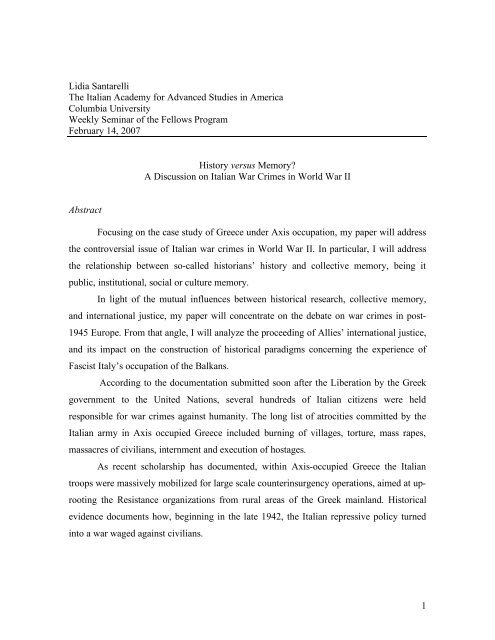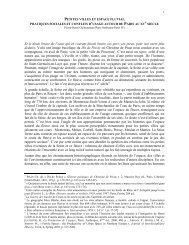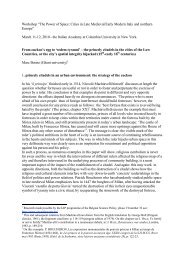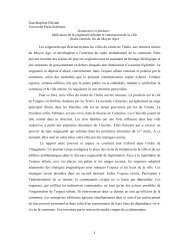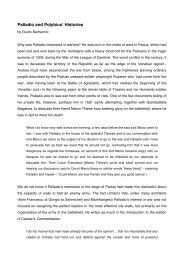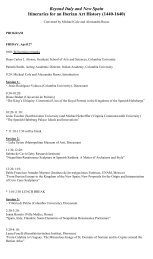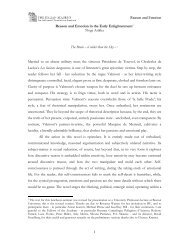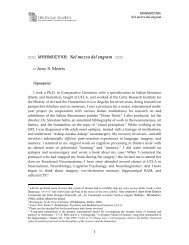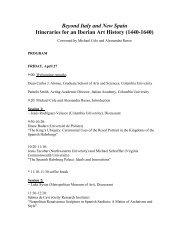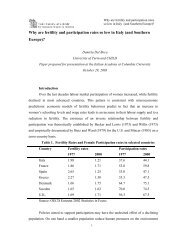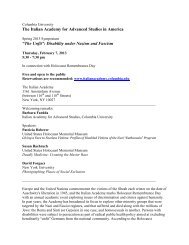A Discussion on Italian War Crimes in World War II - The Italian ...
A Discussion on Italian War Crimes in World War II - The Italian ...
A Discussion on Italian War Crimes in World War II - The Italian ...
You also want an ePaper? Increase the reach of your titles
YUMPU automatically turns print PDFs into web optimized ePapers that Google loves.
Lidia Santarelli<br />
<strong>The</strong> <strong>Italian</strong> Academy for Advanced Studies <strong>in</strong> America<br />
Columbia University<br />
Weekly Sem<strong>in</strong>ar of the Fellows Program<br />
February 14, 2007<br />
History versus Memory?<br />
A <str<strong>on</strong>g>Discussi<strong>on</strong></str<strong>on</strong>g> <strong>on</strong> <strong>Italian</strong> <strong>War</strong> <strong>Crimes</strong> <strong>in</strong> <strong>World</strong> <strong>War</strong> <strong>II</strong><br />
Abstract<br />
Focus<strong>in</strong>g <strong>on</strong> the case study of Greece under Axis occupati<strong>on</strong>, my paper will address<br />
the c<strong>on</strong>troversial issue of <strong>Italian</strong> war crimes <strong>in</strong> <strong>World</strong> <strong>War</strong> <strong>II</strong>. In particular, I will address<br />
the relati<strong>on</strong>ship between so-called historians’ history and collective memory, be<strong>in</strong>g it<br />
public, <strong>in</strong>stituti<strong>on</strong>al, social or culture memory.<br />
In light of the mutual <strong>in</strong>fluences between historical research, collective memory,<br />
and <strong>in</strong>ternati<strong>on</strong>al justice, my paper will c<strong>on</strong>centrate <strong>on</strong> the debate <strong>on</strong> war crimes <strong>in</strong> post-<br />
1945 Europe. From that angle, I will analyze the proceed<strong>in</strong>g of Allies’ <strong>in</strong>ternati<strong>on</strong>al justice,<br />
and its impact <strong>on</strong> the c<strong>on</strong>structi<strong>on</strong> of historical paradigms c<strong>on</strong>cern<strong>in</strong>g the experience of<br />
Fascist Italy’s occupati<strong>on</strong> of the Balkans.<br />
Accord<strong>in</strong>g to the documentati<strong>on</strong> submitted so<strong>on</strong> after the Liberati<strong>on</strong> by the Greek<br />
government to the United Nati<strong>on</strong>s, several hundreds of <strong>Italian</strong> citizens were held<br />
resp<strong>on</strong>sible for war crimes aga<strong>in</strong>st humanity. <strong>The</strong> l<strong>on</strong>g list of atrocities committed by the<br />
<strong>Italian</strong> army <strong>in</strong> Axis occupied Greece <strong>in</strong>cluded burn<strong>in</strong>g of villages, torture, mass rapes,<br />
massacres of civilians, <strong>in</strong>ternment and executi<strong>on</strong> of hostages.<br />
As recent scholarship has documented, with<strong>in</strong> Axis-occupied Greece the <strong>Italian</strong><br />
troops were massively mobilized for large scale counter<strong>in</strong>surgency operati<strong>on</strong>s, aimed at uproot<strong>in</strong>g<br />
the Resistance organizati<strong>on</strong>s from rural areas of the Greek ma<strong>in</strong>land. Historical<br />
evidence documents how, beg<strong>in</strong>n<strong>in</strong>g <strong>in</strong> the late 1942, the <strong>Italian</strong> repressive policy turned<br />
<strong>in</strong>to a war waged aga<strong>in</strong>st civilians.<br />
1
More than sixty years after the end of <strong>World</strong> <strong>War</strong> <strong>II</strong>, we have trouble recogniz<strong>in</strong>g<br />
the bloodsta<strong>in</strong>ed portrait of the <strong>Italian</strong> occupati<strong>on</strong> force as the – to us more familiar – ic<strong>on</strong><br />
of the “good <strong>Italian</strong> soldier.” From the 1950s <strong>on</strong>wards, both <strong>in</strong> Italy and abroad this ic<strong>on</strong><br />
has been c<strong>on</strong>secrated by c<strong>in</strong>ema, literature, and public discourse, as well as by<br />
historiography. Despite the gloomy scenario sketched by observers <strong>in</strong> the years<br />
immediately follow<strong>in</strong>g the Liberati<strong>on</strong>, <strong>in</strong> post-1945 Europe it gradually prevailed the<br />
percepti<strong>on</strong> that the <strong>Italian</strong> occupati<strong>on</strong> had been mild and for the most part bloodless <strong>in</strong><br />
character.<br />
Such a historical narrative seems to have been enforced even by the collective<br />
memory of the victims. In c<strong>on</strong>temporary Greece, <strong>in</strong> fact, historical representati<strong>on</strong>s of the<br />
period of Axis occupati<strong>on</strong> have generally emphasised the theme of fraternizati<strong>on</strong> between<br />
the <strong>Italian</strong> occupy<strong>in</strong>g troops and the Greek occupied populati<strong>on</strong>, while remark<strong>in</strong>g the<br />
violent character of the c<strong>on</strong>comitant German occupati<strong>on</strong>.<br />
In appearance, never have history and collective memory seemed to offer us such<br />
discordant versi<strong>on</strong>s of the past. Such a paradox, and the sense of dislocati<strong>on</strong> deriv<strong>in</strong>g from<br />
it, are reveal<strong>in</strong>g of the problematic relati<strong>on</strong>ship which, <strong>in</strong> post-1945 Europe, has occurred<br />
between the traumatic legacy of <strong>World</strong> <strong>War</strong> <strong>II</strong>, and the narrative paradigms which later<br />
<strong>in</strong>formed the historical representati<strong>on</strong> of the war period.<br />
In this paper, I will explore the orig<strong>in</strong>s of that paradox, c<strong>on</strong>centrat<strong>in</strong>g <strong>on</strong> the<br />
c<strong>on</strong>necti<strong>on</strong> between judiciary paradigms lead<strong>in</strong>g post-war <strong>in</strong>ternati<strong>on</strong>al justice and the<br />
shap<strong>in</strong>g of collective memory of <strong>World</strong> <strong>War</strong> <strong>II</strong>.<br />
2


